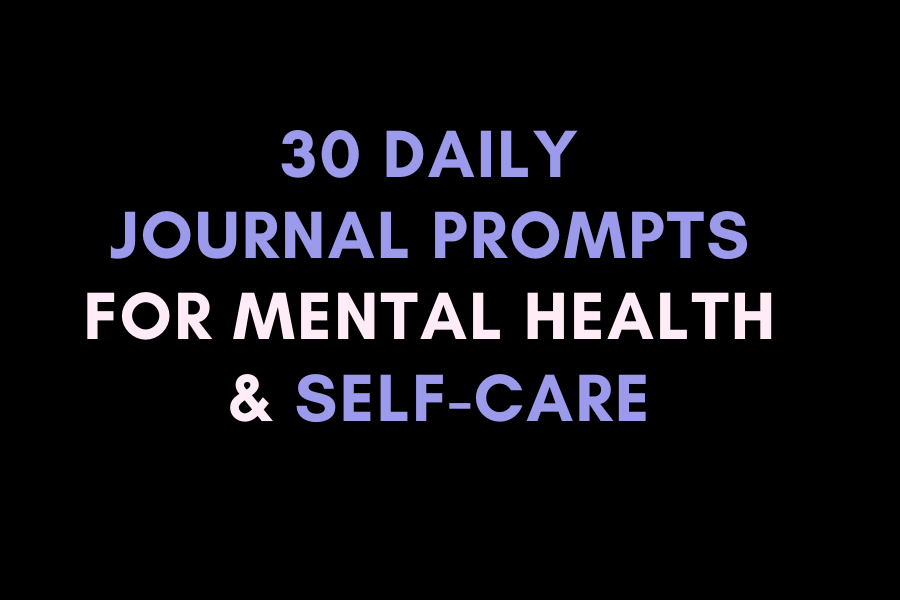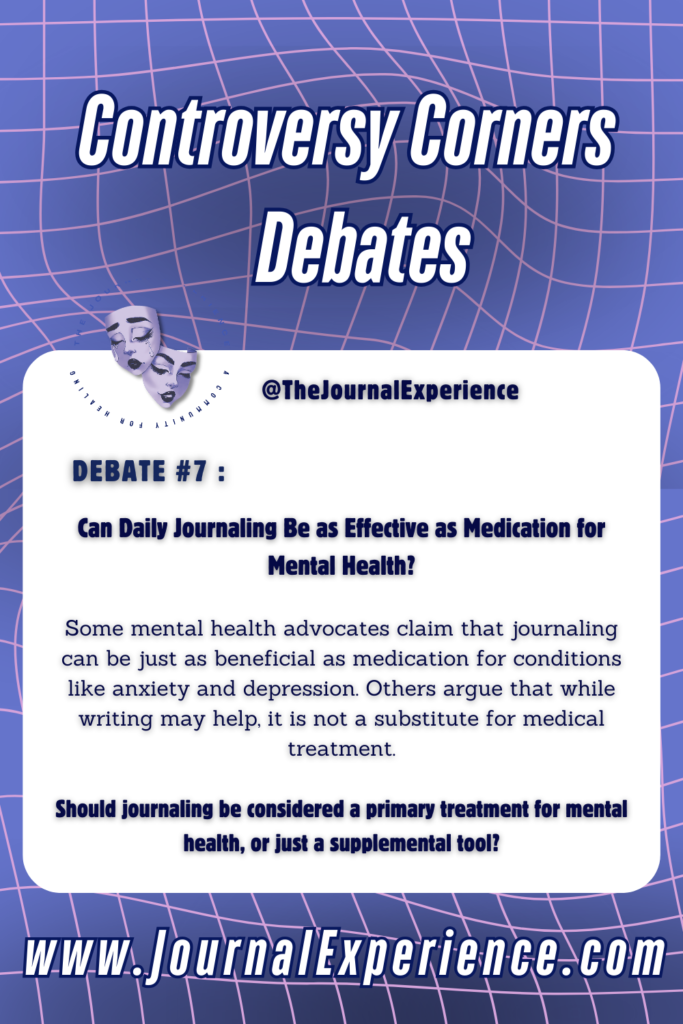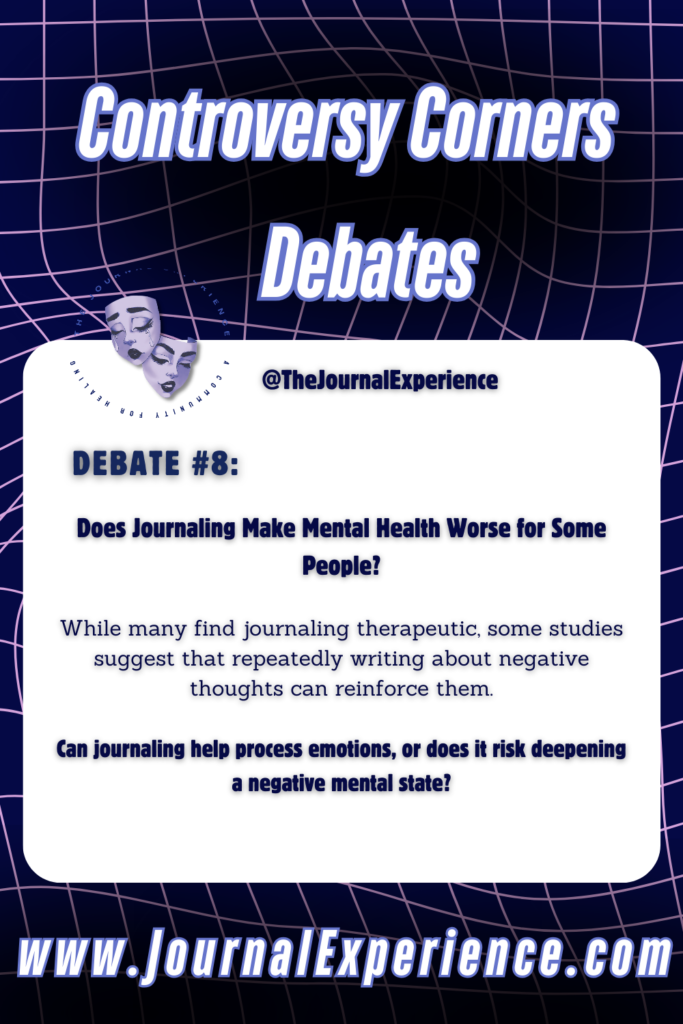Daily journaling is a powerful tool for improving mental health, reducing stress, and increasing self-awareness. Writing down your thoughts and emotions each day helps you process experiences, identify patterns, and cultivate a sense of clarity and peace.

Many therapists recommend journaling as a self-care practice because it provides a safe space for reflection, emotional release, and personal growth.Developing the habit of reflective writing can serve as a therapeutic outlet, allowing you to navigate challenges, celebrate victories, and build resilience.
Whether you’re looking to manage anxiety, improve your mood, or simply create a moment of mindfulness in your day, structured journal prompts can help guide your writing.
In this post, we’ll explore 30 daily journal prompts for mental health that can support emotional well-being and self-discovery. If you’re looking for additional structured journaling resources, consider joining The Journal Experience for exclusive resources and guided exercises designed to support your mental health journey.
Daily Journal Prompts for Mental Health
1. Morning Reflection
Starting your day with intention can set a positive tone and improve mental clarity. The way you begin your morning can influence your mindset, energy levels, and overall mood. Taking a few moments to reflect before diving into your day can help you approach it with purpose and positivity.
These prompts encourage self-awareness and mindfulness:
- What is one positive affirmation you want to focus on today? Write it down and repeat it throughout the day.
- How do you want to feel at the end of the day, and what actions can help you achieve that? Set an emotional goal and outline steps to maintain balance.
- What are three things you’re looking forward to today? Shifting focus to positive expectations can create excitement and motivation.
- What is one habit you’d like to cultivate for better mental well-being? Small, intentional changes can lead to lasting improvements.
- How can you show yourself kindness and compassion today? Think of one way to practice self-love, whether it’s taking breaks, speaking kindly to yourself, or giving yourself grace.
2. Stress & Anxiety Check-In
Stress and anxiety are natural responses to life’s challenges, but unchecked, they can negatively impact mental and physical health. Recognizing your stressors and actively working to address them can help you build resilience.
These prompts help you identify stressors and develop coping strategies:
- What’s something that’s been weighing on your mind lately? Write freely and explore why it’s affecting you.
- How does stress show up in your body, and what helps you release it? Notice physical symptoms of stress and identify relaxation techniques that work for you.
- Write about a time when you successfully managed a stressful situation. What did you do? Reflecting on past successes can boost confidence in your ability to cope.
- What are three small steps you can take to reduce stress in your life? Even minor changes—such as adjusting your routine or setting boundaries—can make a significant difference.
- What are your current top priorities, and are they aligned with your well-being? Evaluate whether your daily choices support your mental and emotional health.

3. Emotional Expression
Understanding and expressing emotions in a healthy way is essential for mental well-being. Journaling offers a safe space to process emotions without judgment, helping you gain insight into your thoughts and reactions.
These prompts help you explore and express feelings:
- Describe a moment today that made you feel either happy or overwhelmed. What about the situation triggered those emotions?
- If your emotions could speak, what would they say to you right now? Give them a voice and acknowledge their presence.
- What’s a recent challenge you faced, and how did it affect your emotions? Reflecting on emotional responses can provide clarity on personal growth.
- Write a letter to an emotion you struggle with (e.g., “Dear Anxiety…”). Addressing emotions directly can foster self-acceptance and healing.
- What is one emotion you would like to embrace more fully, and why? Exploring your relationship with emotions can lead to greater emotional intelligence.
4. Gratitude Practice
Gratitude journaling helps shift your perspective to focus on positivity and appreciation. Studies show that practicing gratitude can increase happiness and reduce stress.
Use these prompts to cultivate a grateful mindset:
- List three things you’re grateful for right now. No matter how small, recognizing blessings fosters contentment.
- What’s a small but meaningful moment that brought you joy recently? Simple moments can have profound impacts on well-being.
- Who in your life are you especially grateful for, and why? Consider reaching out to express your appreciation.
- Reflect on a past challenge that turned out to be a blessing in disguise. Hardships often teach valuable lessons and lead to unexpected opportunities.
- What’s something about yourself that you deeply appreciate? Self-gratitude is just as important as gratitude for others.
5. Self-Care & Mindfulness
Self-care isn’t just about treating yourself—it’s about maintaining habits that nourish your mental, emotional, and physical well-being. Practicing mindfulness can help you stay present and reduce anxiety.
These prompts encourage self-compassion and balance:
- What is one way you can prioritize self-care today? Choose an action that recharges your mind or body.
- Describe a self-care activity that makes you feel truly refreshed and recharged. When was the last time you engaged in this activity?
- What boundaries do you need to set for your mental well-being? Boundaries protect energy and reduce overwhelm.
- How can you incorporate more mindfulness into your daily routine? Even five minutes of mindful breathing can be beneficial.
- Write about a recent moment where you felt completely present and at peace. What helped you achieve that sense of calm?
Additional Journaling Sections for Deeper Self-Exploration
6. Identifying Core Beliefs
Your core beliefs shape how you perceive yourself and the world. Identifying and challenging limiting beliefs can help foster growth.
- What are some core beliefs you hold about yourself? Are they empowering or limiting?
- How do these beliefs influence your actions and decisions? Examine how they shape your choices.
- Are there any beliefs you want to challenge or change? Why? What new beliefs would better support you?

7. Navigating Relationships Through Journaling
Healthy relationships contribute to mental well-being. Journaling can help clarify how relationships affect your emotions.
- How do your relationships impact your mental health, and what boundaries do you need to set?
- What is one relationship in your life that brings you joy, and why?
- How do you handle conflict, and is there anything you’d like to improve about your approach?
8. Processing Difficult Emotions
Journaling provides a healthy outlet for navigating tough emotions.
- When was the last time you felt deeply misunderstood, and how did you respond?
- How do you usually deal with disappointment, and is there a healthier way to cope?
9. Self-Discovery & Personal Growth
- What is one lesson life has taught you recently?
- How have you grown emotionally in the past year?
- If you could give your younger self advice, what would it be?
Overview
Daily journaling is a simple yet powerful habit that can enhance emotional resilience, self-awareness, and overall mental well-being. Whether you’re using journaling to reduce stress, cultivate gratitude, or navigate difficult emotions, these prompts can serve as a valuable guide.
If you’re looking for more structured journaling support, consider joining The Journal Experience to access exclusive guided exercises and additional mental health resources. Start your journaling journey today and take an active step toward a healthier, more balanced mind.
